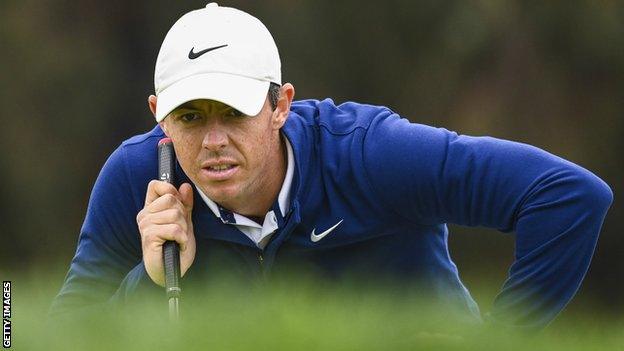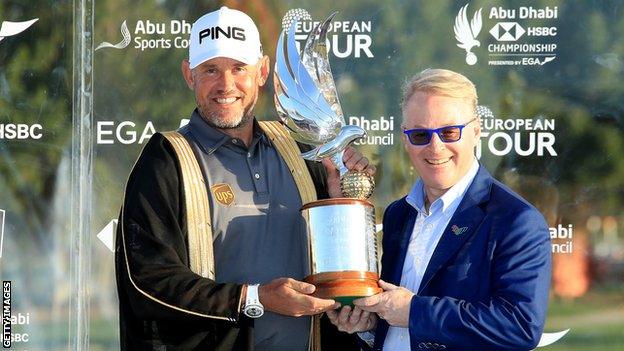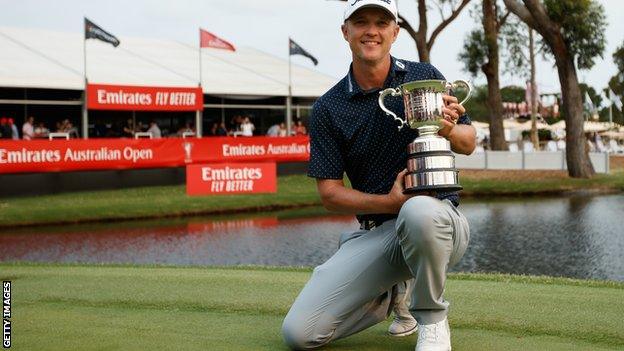Professional Golf League faces challenges but could shake up status quo - Iain Carter
- Published
- comments

Rory McIlroy says he was first approached by the Professional Golf League in 2014 - he has distanced himself from the plans but said it could provide a catalyst for change on the established tours
Rarely have golf's leading professional tours been more tightly aligned, and their united front has good cause given the threat of a rebel world circuit trying to sign up the biggest names in the game.
The so-called Professional Golf League has ambitious plans to reshape the sport. It wants a big-money, television-friendly, grand prix-style 18-event world tour, featuring 48 top players with individual and team dynamics involved in the competition.
It is proposing a series of 54-hole tournaments, with shotgun starts - when groups of players tee off simultaneously on different holes - for the first two rounds to limit the television window to under five hours. There would be no cut at each of these $10m events.
It is difficult to envisage it succeeding against the might of the PGA and European Tours, who would see their current business models ripped apart were the proposals to come to fruition.
Yet those behind PGL are bullish and published releases over the weekend suggesting their aim is to be up and running as early as January 2022.
They say they want to work with the establishment, not against it. Cooperation of this sort is likely to be in short supply.
The American-based PGA Tour is the world's most lucrative circuit and routinely makes multi-millionaires of the world's best golfers. It would be a huge surprise were it to grant releases for members to play a rival circuit.
The tour also operates a very successful pension and players would be reluctant to risk the security afforded by the scheme.
And how could the PGL function without the blessing of the official world rankings? These are run by an amalgamation of all the established tours and governing bodies.
Even so, bosses are taking the threat seriously. There was a striking similarity in dismissive messages coming from both the PGA and European Tours when details of the proposed PGL emerged.
"We don't comment on the business of other tours, real or hypothetical," said the Florida-based PGA Tour.
When I spoke to European Tour chief executive Keith Pelley, he said: "We are not really in the business of commenting on other tours whether they are real or whether they are fictional."
Asked about the potential impact on his circuit, Pelley added: "You are speaking with hypothetical thoughts and I don't speak from a hypothetical perspective, I speak from reality. And our business has a tremendous amount of momentum right now.
"We are excited about our recent partnership with the LET [Ladies European Tour] and our relationship is getting closer and closer with the PGA Tour so that is what our focus is right now."
Pelley was speaking at last Friday's launch of the LET's record £15m schedule for 2020.

Keith Pelley, right, chief executive of the European Tour, says he would not comment on other tours - "whether real or fictional"
Mike Whan, head of the LPGA, was also at the launch. He called it "the age of collaboration".
The rival golfing bodies, undoubtedly, see the upside of closer ties and, as Pelley intimated, the relationship between his Wentworth-based operation and the PGA Tour is becoming ever more closely aligned.
But despite the success of the current set-up - with spiralling purses, massive sponsorship and TV deals in the United States - there is a degree of fascination among leading players about the PGL, which has been working on its model for the past six years.
"I'm curious but I don't know enough about it," said five-time major winner Phil Mickelson. "I'm listening to it. I think it is intriguing but I don't know enough about it to comment publicly, but I hope to learn more."
Rory McIlroy confirmed he was first approached in 2014.
"I certainly wouldn't want to lose what's been built in the last 40 to 50 years," the Northern Irishman said.
But he did say the challenge of these outsiders could prompt a remodelling of the current structure.
"It might be a catalyst for some changes on this tour," said the four-time major winner. "That can help it grow and move forward and reward the top players the way they should be, I guess."
Those behind the PGL project have maintained a degree of mystery. There are rumours of Saudi Arabian money being involved and it is known that the boutique investment bank, the Raine Group, is a key stakeholder.
One of the Raine Group's partners is golf fanatic Colin Neville, who has brokered major sporting deals including a $400m Chinese investment in Manchester City and who, according to a 2016 interview in the Sports Business Journal, external, would most like to swap jobs for a day with McIlroy.
PGL's backers believe the current golf set-up is outdated.
"If you want the world to watch, you have to showcase your best product, week-in week-out. Golf doesn't do that currently," it said in a press release.
"If you had the chance to start again you wouldn't create professional golf as it exists today. The league is that chance.
"We believe we'll succeed because the league is what fans, sponsors and broadcasters want - and the best players deserve. It will revitalise the sport for this and future generations."

There has been talk that the Australian Open could be part of the rebel PGL circuit
The established tours are compromised by being member organisations. They have to act in the best interests of their players and sometimes that is contrary to creating an ideal spectacle.
For example, the European Tour's elite Rolex Series would be far more impactful if it were a set of limited-field tournaments, with the best-of-the-best chasing the big money.
But try selling that to the bulk of your membership; you could not get it through. The rank-and-file players want their chance of winning the largest cheques.
Things may have to change, though. There is now talk that the Australian Open could be part of the rebel circuit, with a women's version as well.
Make no mistake, PGL faces massive challenges to muscle in at the top of professional golf but the fact it is agitating could be enough to shake the status quo.
Expect the establishment to come together to fight off the outsiders. Indeed, there is evidence aplenty that this is already happening.
